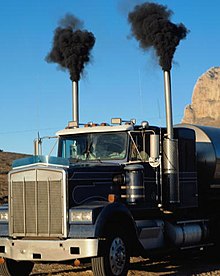
Back Uitlaatgas Afrikaans غاز عادم Arabic Выхлапныя газы Byelorussian Výfukové plyny Czech Тĕтĕм-сĕрĕм CV Udstødningsgas Danish Abgas German Gas de escape Spanish Heitgaas Estonian گاز خروجی Persian
| Part of a series on |
| Pollution |
|---|
 |
Exhaust gas or flue gas is emitted as a result of the combustion of fuels such as natural gas, gasoline (petrol), diesel fuel, fuel oil, biodiesel blends,[1] or coal. According to the type of engine, it is discharged into the atmosphere through an exhaust pipe, flue gas stack, or propelling nozzle. It often disperses downwind in a pattern called an exhaust plume.
It is a major component of motor vehicle emissions (and from stationary internal combustion engines), which can also include crankcase blow-by and evaporation of unused gasoline.
Motor vehicle emissions are a common source of air pollution and are a major ingredient in the creation of smog in some large cities. A 2013 study by the Massachusetts Institute of Technology (MIT) indicates that 53,000 early deaths occur per year in the United States alone because of vehicle emissions.[2] According to another study from the same university, traffic fumes alone cause the death of 5,000 people every year just in the United Kingdom.[3]
- ^ Omidvarborna; et al. (2014). "Characterization of particulate matter emitted from transit buses fueled with B20 in idle modes". Journal of Environmental Chemical Engineering. 2 (4): 2335–2342. doi:10.1016/j.jece.2014.09.020.
- ^ Caiazzo, Fabio; Ashok, Akshay; Waitz, Ian A.; Yim, Steve H.L.; Barrett, Steven R.H. (November 2013). "Air pollution and early deaths in the United States. Part I: Quantifying the impact of major sectors in 2005". Atmospheric Environment. 79: 198–208. Bibcode:2013AtmEn..79..198C. doi:10.1016/j.atmosenv.2013.05.081.
- ^ Roland Pease. "Traffic pollution kills 5,000 a year in UK, says study". BBC News.
© MMXXIII Rich X Search. We shall prevail. All rights reserved. Rich X Search